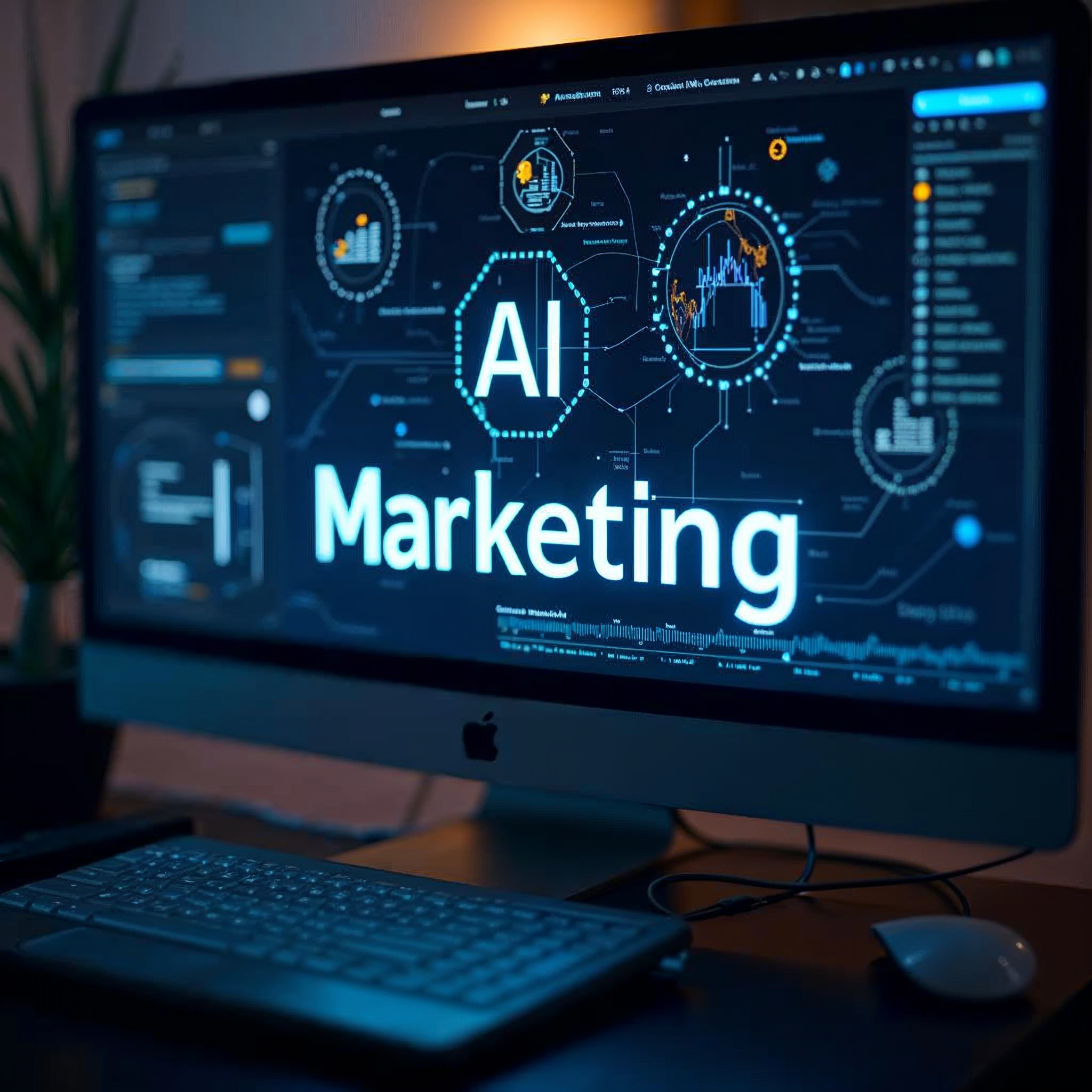AI in Marketing: How Artificial Intelligence is Shaping New Digital Marketing Trends
Artificial intelligence is rapidly becoming a cornerstone in the world of marketing, reshaping how businesses connect with their audiences. As companies strive to stay ahead, AI in marketing offers powerful tools that drive efficiency and personalization, paving the way for new digital marketing trends. From predictive analytics to chatbots, artificial intelligence is enhancing marketing strategies, allowing brands to engage with consumers on a deeper level. In this article, we will explore the various ways AI is being integrated into marketing practices, providing insights for marketers and business owners eager to harness its potential.
Understanding AI in Marketing
Artificial Intelligence (AI) has become a game-changer in the marketing world, offering new ways to analyze data, automate tasks, and personalize customer interactions. This section explores the key benefits of AI and how it’s shaping marketing strategies.
Key Benefits of AI
AI in marketing provides numerous advantages for businesses looking to enhance their digital presence and customer engagement.
One of the primary benefits is improved efficiency. AI-powered tools can analyze vast amounts of data quickly, allowing marketers to make informed decisions faster than ever before.
Personalization is another crucial benefit. AI algorithms can process customer data to create tailored experiences, increasing engagement and conversion rates.
Lastly, AI enables predictive analytics, helping businesses anticipate market trends and customer behaviors, leading to more proactive and effective marketing strategies.
AI-driven Marketing Strategies
AI is revolutionizing marketing strategies by providing data-driven insights and automating complex processes.
Machine learning algorithms analyze customer behavior patterns, enabling marketers to create more targeted campaigns. This leads to higher conversion rates and improved ROI.
Natural Language Processing (NLP) is another AI technology transforming marketing. It powers chatbots and virtual assistants, enhancing customer service and engagement.
AI-driven content optimization tools help marketers create more effective content by analyzing performance metrics and suggesting improvements.
Emerging Digital Marketing Trends
The digital marketing landscape is constantly evolving, with AI playing a significant role in shaping new trends. This section examines two key areas where AI is making a substantial impact: predictive analytics and personalized customer experiences.
Predictive Analytics and Insights
Predictive analytics uses AI to forecast future trends and behaviors based on historical data.
In marketing, this technology allows businesses to anticipate customer needs and preferences. By analyzing past purchasing patterns, browsing history, and demographic information, AI can predict which products or services a customer is likely to be interested in next.
This insight enables marketers to create targeted campaigns that resonate with their audience. For example, an e-commerce site might use predictive analytics to recommend products to customers based on their browsing history and past purchases.
Predictive analytics also helps in optimizing ad spend by identifying the most effective channels and times for reaching specific customer segments.
Personalized Customer Experiences
AI is transforming how businesses interact with their customers by enabling hyper-personalization.
Through AI-powered algorithms, companies can analyze individual customer data to create tailored experiences across various touchpoints. This includes personalized product recommendations, customized email content, and dynamic website experiences.
For instance, a streaming service might use AI to recommend shows based on a user’s viewing history and preferences. Similarly, an online retailer could use AI to adjust its homepage layout and product displays for each visitor.
This level of personalization not only improves customer satisfaction but also increases engagement and conversion rates.
Artificial Intelligence Tools for Marketers
AI offers a wide range of tools that marketers can leverage to enhance their strategies and streamline operations. This section focuses on two popular AI applications in marketing: chatbots and automated content creation.
AI-powered Chatbots
Chatbots have become an essential tool for businesses looking to improve customer service and engagement.
These AI-powered virtual assistants can handle a wide range of customer inquiries, from product information to order tracking. By providing instant responses 24/7, chatbots significantly improve customer satisfaction and reduce the workload on human customer service representatives.
Advanced chatbots use Natural Language Processing (NLP) to understand and respond to customer queries in a more human-like manner. This technology allows for more natural conversations and can even detect customer sentiment.
Some chatbots can also gather valuable customer data during interactions, providing insights that can be used to improve marketing strategies and product offerings.
Automated Content Creation
AI is making significant strides in the realm of content creation, offering tools that can assist marketers in producing high-quality content more efficiently.
Natural Language Generation (NLG) technology can create written content such as product descriptions, social media posts, and even basic news articles. While not replacing human creativity, these tools can help with routine content tasks, freeing up time for more strategic work.
AI-powered tools can also analyze existing content performance and provide recommendations for improvement. This includes suggestions for SEO optimization, readability enhancements, and topic ideas based on trending searches.
Some AI tools can even generate visual content, such as basic designs or image variations, further expanding the possibilities for automated content creation.
Overcoming Challenges with AI
While AI offers numerous benefits, its implementation in marketing also presents challenges. This section addresses two critical areas: ethical considerations and the need to balance automation with human interaction.
Ethical Considerations in AI
As AI becomes more prevalent in marketing, ethical concerns have come to the forefront of discussions.
One primary concern is data privacy. AI systems often require large amounts of customer data to function effectively, raising questions about how this data is collected, stored, and used. Marketers must ensure they comply with data protection regulations and maintain transparency with customers about data usage.
Another ethical consideration is the potential for bias in AI algorithms. If not properly designed and monitored, AI systems can perpetuate or even amplify existing biases, leading to unfair treatment of certain customer groups.
Transparency is also crucial. Customers should be informed when they are interacting with AI systems, such as chatbots, to maintain trust and authenticity in brand communications.
Balancing Automation and Human Touch
While AI can significantly improve efficiency, finding the right balance between automation and human interaction is crucial for maintaining authentic customer relationships.
AI is excellent for handling routine tasks and providing quick responses, but complex issues often require human empathy and problem-solving skills. Marketers should identify which processes can be automated and which require a human touch.
Personalization through AI should enhance, not replace, genuine human connections. For example, AI can help identify when a customer might need personal attention from a human representative.
Training staff to work alongside AI systems is also important. This ensures that employees can step in seamlessly when needed and that the transition between AI and human interaction is smooth for the customer.
Future of Digital Marketing
As we look ahead, it’s clear that AI will continue to play a pivotal role in shaping the future of digital marketing. This section explores AI’s influence on future trends and how businesses can prepare for this evolving landscape.
AI’s Role in Future Trends
AI is set to drive several key trends in the future of digital marketing.
Voice search optimization will become increasingly important as more consumers use voice-activated devices. AI will play a crucial role in understanding natural language queries and delivering relevant results.
Augmented Reality (AR) and Virtual Reality (VR) experiences, powered by AI, will offer new ways for brands to engage with customers, providing immersive product demonstrations and virtual try-ons.
AI will enable even more sophisticated predictive marketing, allowing businesses to anticipate customer needs and market trends with greater accuracy.
Preparing Your Business for AI
To stay competitive in the AI-driven marketing landscape, businesses need to take proactive steps.
Investing in data infrastructure is crucial. AI systems require high-quality, organized data to function effectively. Businesses should focus on collecting and managing customer data responsibly.
Upskilling employees is another important step. While AI can automate many tasks, it also creates a need for new skills. Training staff to work with AI tools and interpret AI-generated insights will be essential.
Lastly, businesses should stay informed about AI developments and be willing to experiment with new technologies. This could involve partnering with AI startups or setting up innovation labs to explore AI applications in marketing.


